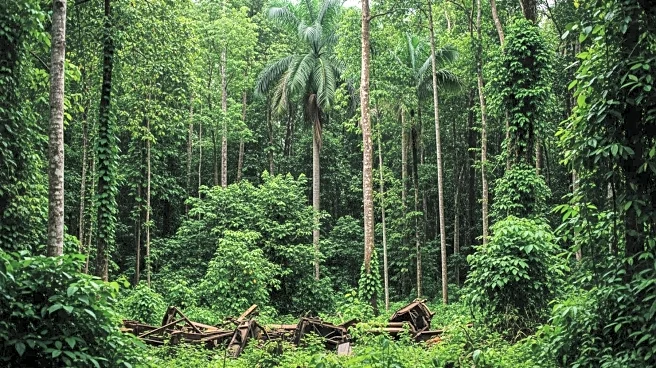What's Happening?
Environmentalists in West Africa are raising alarms over significant deforestation driven by Chinese companies involved in illegal logging and other environmentally harmful activities. In Nigeria, several
Chinese firms have been sealed and officials arrested for environmental violations, including improper waste disposal and illegal logging. A workshop in Ghana highlighted the impact of Chinese demand for timber, particularly rosewood, which has become the most trafficked illegal wildlife product. The deforestation is threatening biodiversity, climate regulation, and local livelihoods across the region. Chinese infrastructure and mining projects are also contributing to habitat fragmentation and community displacement.
Why It's Important?
The unchecked environmental exploitation by Chinese companies in West Africa poses severe ecological and social challenges. The deforestation and illegal logging activities are not only leading to biodiversity loss but also undermining local economies and traditional land rights. The demand for timber and wildlife products is driven by global markets, with China being a significant player. This situation highlights the need for stronger enforcement of environmental regulations and international cooperation to address the ecological and humanitarian crisis. The actions of these companies could lead to long-term environmental degradation and social instability in the region.
What's Next?
West African nations may need to strengthen their regulatory frameworks and collaborate with international bodies to hold violators accountable. There is a call for these countries to confront China directly and demand an end to the exploitation of their natural resources. If diplomatic efforts fail, raising the issue at global forums could be a necessary step to garner international support and intervention. The situation underscores the importance of sustainable development practices and the need for global awareness and action to protect vulnerable ecosystems and communities.
Beyond the Headlines
The environmental violations by Chinese companies in West Africa also raise ethical questions about corporate responsibility and the role of international trade in environmental degradation. The collusion between local officials and foreign companies highlights systemic corruption issues that hinder effective governance and accountability. This situation could lead to increased scrutiny of international business practices and pressure for more transparent and sustainable operations. The long-term impact on local communities, including potential health risks and loss of livelihoods, emphasizes the need for inclusive and equitable development strategies.











